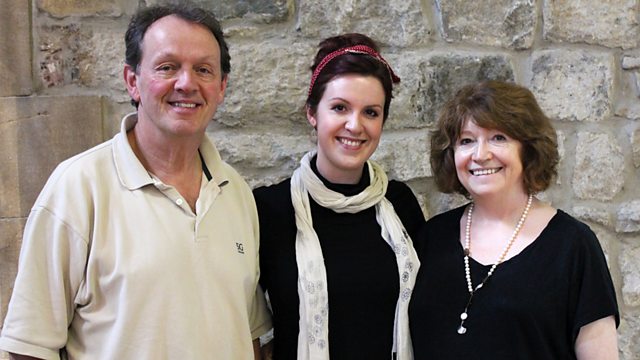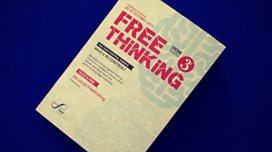
Free Thinking: Who's in Control?
A live edition from Radio 3's 2013 Free Thinking festival of ideas, with readers Madelaine Newton and Kevin Whately, plus music from Kathryn Tickell and the Leonore Piano Trio.
In this special edition of Words and Music, recorded in front of an audience at St Marys Heritage Centre, Gateshead as part of this year's Free Thinking Festival, readers Kevin Whately (Inspector Morse, Auf Wiedersehen, Pet) and Madelaine Newton (When the Boat Comes In), read a selection of poetry and prose on the theme of this year's festival: 'Who's In Control?'.
They appear alongside their daughter Kitty Whately, the mezzo-soprano and Â鶹ԼÅÄ Radio 3 New Generation Artist, the acclaimed Leonore Piano Trio and Kathryn Tickell, the Northumbrian piper and composer whose work is deeply rooted in the folk traditions of the North East.
Words come courtesy of Shakespeare, Dickens and Wordsworth, and musically we'll move from Beethoven to Sondheim, Arne to Mahler.
Â鶹ԼÅÄ Radio 3's Free Thinking Festival takes place at Sage Gateshead 25-27 October and is broadcast for three weeks on Radio 3 from Friday 25 October.
Last on
![]()
Learn about this year's Free Thinking Festival
Music Played
Timings (where shown) are from the start of the programme in hours and minutes
-
![]() 00:01
00:01Benjamin Britten
Folksong arrangements for voice and orchestra
Performer: Gamal Khanis. Performer: Kitty Whately. -
Basil Bunting
What the Chairman Told Tom (from Second Book of Odes), read by Madelaine Newton
![]() 00:02
00:02William Pigg
Carrick's Hornpipe
Performer: Julian Sutton. Performer: Kathryn Tickell.Ripyard Cuddling (aka Jack Davitt)
The Truth Aboot the Waall, read by Kevin Whately
![]() 00:07
00:07Traditional Irish
DA BRIG
Performer: Julian Sutton. Performer: Kathryn Tickell.John Masefield
Sea Fever, read by Madelaine Newton
Herman Melville
Moby-Dick (excerpt), read by Kevin Whately
![]() 00:13
00:13Samuel Barber
Sonata Op.6 for cello and piano
Performer: Gemma Rosefield. Performer: Jim Horton.![]() 00:19
00:19Thomas Arne
The Tempest - songs from the play
Performer: Gamal Khanis. Performer: Kitty Whately.William Shakespeare
The Tempest (excerpt), read by Madelaine Newton and Kevin Whately
![]() 00:23
00:23Frédéric Chopin
24 Preludes Op.28 for piano
Performer: Jim Horton.Charles Dickens
Hard Times (excerpt), read by Kevin Whately
![]() 00:26
00:26AntonÃn Dvořák
Trio no. 3 in F minor Op.65 for piano and strings
Performer: Leonore Piano Trio.Alan Ayckbourn
Table Manners (excerpt), read by Kevin Whately and Madelaine Newton
![]() 00:35
00:35Stephen Sondheim
Follies - musical
Performer: Gamal Khamis. Performer: Kitty Whately.Roald Dahl
Charlie and the Chocolate Factory, read by Madelaine Newton
![]() 00:40
00:40Gustav Mahler
Lieder und Gesange (aus der Jugendzeit) for voice and piano
Performer: Gamal Khanis. Performer: Kitty Whately.William Shakespeare
Macbeth (excerpt), read by Kevin Whately and Madelaine Newton
![]() 00:44
00:44(Trad)
Gin Ye Kiss My Wife I'll Tell the Minister
Composer: Kathryn Tickell. Performer: Julian Sutton. Performer: Kathryn Tickell.Peter Porter
Your Attention Please (excerpt), read by Kevin Whately
![]() 00:47
00:47Johann Sebastian Bach
Suite no. 1 in G major BWV.1007 for cello solo
Performer: Gemma Rosefield.Joseph Skipsey
Mother Wept, read by Madelaine Newton
![]() 00:50
00:50Julian Sutton, Kathryn Tickell & Kitty Whately
Ma bonny lad
Music Arranger: Kathryn Tickell.![]() 00:53
00:53Julian Sutton & Kathryn Tickell
Hens march o'er the midden
Music Arranger: Kathryn Tickell.George Orwell
Animal Farm (excerpt), read by Kevin Whately
![]() 00:55
00:55Dmitry Shostakovich
Trio no. 2 in E minor Op.67 for piano and strings
Performer: Leonore Piano Trio.Anna Akhmatova
Prologue (Requiem), read by Madelaine Newton
William Wordsworth
The Prelude (excerpt), read by Kevin Whately
![]() 01:01
01:01Ludwig van Beethoven
Trio in D major Op.70`1 (Ghost) for piano and strings
Performer: Leonore Piano Trio.Percy Shelley
Ozymandias
![]() 01:09
01:09Robert Schumann
Kreisleriana - 8 fantasies Op.16 for piano
Performer: Jim Horton.Producer's Note
Who’s in control? A question we ask ourselves in the workplace, in our relationships, in our families and when we survey the society in which we live. In this special edition of Words and Music here at the Free Thinking Festival we’ll be exploring ideas of control, from Shakespeare and Wordsworth to Roald Dahl, alongside music which takes us from the vitality of English folk, to the revolutionary zeal of Beethoven and the caustic brilliance of Sondheim.Ìý
The workplace is rife with individual battles for control, and throughout today’s programme we’ll catch glimpses of workers grappling with their fate; from the young lad excited about starting work in the nightmarish mines in Joseph Skipsey’s Mother Weeps, to George Orwell’s biting satire on Stalin’s Russia in Animal Farm. Britten’s arrangement of Come you not from Newcastle? and William Pigg’s Carrick’s Hornpipe situate us musically in the North-East, before we hear Jack Davitt’s take on the building of Hadrian’s Wall, an epic undertaking which culminates in a Geordie version of Hadrian thanking his legions of ‘peasant’ workers by exclaiming: ‘Lads, Aa’m ower the moon’.Ìý
Thomas Arne’s delicate setting of Ariel’s Where the bee sucks, there suck I from Shakespeare’s The Tempest takes us to the island on which Shakespeare explored the idea of control. Prospero’s sorcery represents the autocratic use of control on the mysterious island, including manipulating the weather. Humanity is often powerless in the face of the un-controllable natural world, and we move from one tempest to another as we join Ishmael on the storm-battered deck of The Pequod, in Herman Melville’s Moby-Dick.
Romantic relationships and families are other familiar sites for our everyday grapples with control. We’re lucky enough to have the talented Whately family reading and singing for us today, so we’re in a prime position to explore familial power struggles! We’ll have a glimpse of marital discord from Sondheim’s Follies, before returning to The Bard for the definitive example of a marriage with ‘control issues’, that of the savagely ambitious Lady Macbeth and her ill-fated husband. Roald Dahl and Gustav Mahler appear back-to-back with warnings about badly behaved children – the result of family life where the control dynamic has gone seriously awry.
Perhaps the ultimate expression of societal control comes in the form of our leaders – and more dramatically – from their overthrow. We hear Anna Akhmatova’s heart-breaking reflection on the terrifying grip of Stalinism, alongside Shostakovich’s Second Piano Trio. Wordsworth anxiously muses on the devastation of post-revolutionary Paris in The Prelude, rendered ‘Defenceless as a wood where tigers roam’. Beethoven, once described by Stravinsky as ‘the friend and contemporary of the French Revolution’, provides the musical counterpoint to Wordsworth’s turmoil. We remain in the era of romance and revolution for the close of the programme, with Shelley’s celebrated vision of hubris in Ozymandias. It’s a vision of pathos, where control was once wielded, was lost, and now echoes into silence:
Nothing beside remains. Round the decay
Of that colossal wreck, boundless and bare
The lone and level sands stretch far away.
Ìý
Georgia Mann-Smith (producer)
Broadcast
- Sun 27 Oct 2013 17:30Â鶹ԼÅÄ Radio 3
The hidden history of plant-based diets
Books website
Get closer to books with in-depth articles, quizzes and our picks from radio & TV.
Gallery




